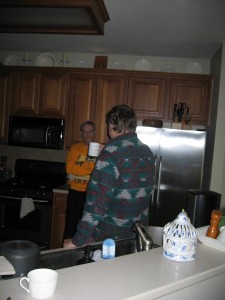January 12, 2012
Shortly before the holidays, I heard Dr. Oz talking about coffee. He played a game with audience members and emphasized that coarsely ground, light roast coffee made with cold water and NEVER microwaved is best when aiming for the benefits of coffee. Benefits? I thought. Isn’t it interesting how different stories emphasize different results?
On the hunt for the science I went. In 2009, a study reported that 3-5 cups of coffee a day related to a reduced risk –65% less — for dementia and Alzheimer’s disease [http://iospress.metapress.com/content/d885346618q57103/].
 I was reminded of my discussion in my book, Talking about health, about old science, new science, conflicting science, and no science. I went online in search of some more science to discuss the coffee and caffeine health benefits. I found the Dr. Oz story: http://www.drozfans.com/dr-ozs-advice/dr-oz-american-roast-coffee-prevents-colon-cancer-coffee-trivia/
I was reminded of my discussion in my book, Talking about health, about old science, new science, conflicting science, and no science. I went online in search of some more science to discuss the coffee and caffeine health benefits. I found the Dr. Oz story: http://www.drozfans.com/dr-ozs-advice/dr-oz-american-roast-coffee-prevents-colon-cancer-coffee-trivia/
An article in 1990 reports findings that the participants who reported drinking more coffee had a higher incidence of colon cancer [http://www.jstor.org/pss/20065645].
A study reported in 1993 found no relationship between more than 34,000 women’s reports of caffeine consumption and breast cancer [http://aje.oxfordjournals.org/content/138/6/380.short].
In 2007, a study found that 2 cups of black tea or decaf. coffee each day related to reduced risk for ovarian cancer, but regular coffee did not show this relationship. Again, women self-reported their behaviors [ http://onlinelibrary.wiley.com/doi/10.1111/j.1525-1438.2006.00773.x/full].
Also in 2007, a study found that drinking 2 cups a day of regular coffee greatly reduced — 43% — risk for liver cancer [http://www.gastrojournal.org/article/S0016-5085(07)00568-9/abstract].
What does it all mean? Talking about health means thinking about when a study was conducted, who particpated, and how the research was done. Self-reports are different from clinical studies. I don’t know of any clinical trials where participants are given coffee over time and compared to participants who do not consume coffee. So the research depends on individuals reporting how much coffee they drink. And then clinical reports about their health status provide a picture of what might be making a difference in the health of some compared to others. So when talking about health, don’t lose sight of the meaning of shorthand expressions like, ‘drinking 2 cups of coffee a day reduces your risk for cancer’…
